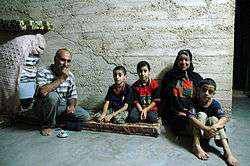
Sumud
Sumud (Arabic: صمود) meaning "steadfastness" or "steadfast perseverance" is an ideological theme and political strategy that first emerged among the Palestinian people through the experience of the dialectic of oppression and resistance in the wake of the 1967 Six-Day War. This noun is derived from a verb meaning "arrange, adorn, lay up, save". Those who are steadfast, that is those who exhibit sumud, are referred to as samidin, the singular forms of which are samid (m.) and samida (f.).
With the passing of the years since 1967, Palestinians have distinguished between two main forms of sumud. The first, static sumud, is more passive and is defined by Ibrahim Dhahak as the "maintenance of Palestinians on their land." The second, resistance sumud (in Arabic, sumud muqawim) is a more dynamic ideology whose aim is to seek ways of building alternative institutions so as to resist and undermine the Israeli occupation of the Palestinian territories.
The ultimate symbol associated with the concept of sumud and the Palestinian sense of rootedness in the land is the olive tree, ubiquitous throughout Palestine. Another icon of sumud that has often been portrayed in Palestinian artwork is that of the mother, and more specifically, a peasant woman depicted as when with child.
Sumud (album)
Sumud (صمود), which was released on 22 May 2012, is the third album by Niyaz. It was originally reported that like their previous album Nine Heavens it would be released as a double album with one disc each for acoustic versions and electronic versions of songs, though it was released as a normal record with ten songs. The album features the guest appearance of A.R. Rahman on the song Mazaar, a traditional Afghan folk song.
The album's lyrics are mostly in Persian (Parishaan, Shah Sanam, Mazaar, Rah-e-Vafa, Masooz and Mahtaab) with two songs in Turkish (Dertli and Arzusun) and features the band's first lyrics in Arabic (Rayat Al Sumud) and Kurdish (Sosin). It is their first album to feature no Urdu songs.
Track listing
Lyrical sources
The words to "Parishaan" are based on various poetry by Baba-Taher (باباطاهر), an 11th-century Sufi mystic.
Several songs are folk songs, some of which have been performed by other artists whose renditions can be found online. "Sosin" was performed by Kurdish singer Hesen Cizîrî (Hesenê Cizrawî), "Masooz" by Qanbar Raastgu (قنبر راستگو). Versions of "Shah Sanam" (shortened from Shâh Sanam Zibâ Sanam (شاه صنم زیبا صنم)) by Navaye Qariyeh, Simâ Binâ (سیما بینا) and Amânj Azarmi (امانج ازرمی) can be found online. "Dertli" is a folk song from the Bolu region of Turkey.
Podcasts:

-
by Sammath
-
by Sammath
-
by Smitty
-
by Smitty
-
by Smitty
Damnation
by: SammathTorment
strike down with great vengeance
thrive in arrogance
defiance of all
strike down with hate
light the flame of heaten pride
torment
onwards to hell
spoils of war
burn in the fire
burn the cross of wrath
only hell awaits
I shall forever burn in the fire
only hell awaits total annihilation
light the flame
swing the axe of war
streams of fire from the sky
